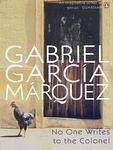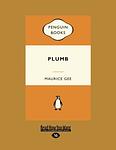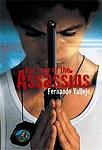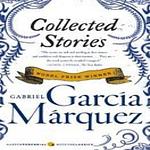The Greatest New Zealander, Colombian Books of All Time
Click to learn how this list is calculated.
This list represents a comprehensive and trusted collection of the greatest books. Developed through a specialized algorithm, it brings together 300 'best of' book lists to form a definitive guide to the world's most acclaimed books. For those interested in how these books are chosen, additional details can be found on the rankings page.
Genres
Countries
Date Range
Reading Statistics
Click the button below to see how many of these books you've read!
Download
If you're interested in downloading this list as a CSV file for use in a spreadsheet application, you can easily do so by clicking the button below. Please note that to ensure a manageable file size and faster download, the CSV will include details for only the first 500 books.
Download-
1. One Hundred Years of Solitude by Gabriel García Márquez
This novel is a multi-generational saga that focuses on the Buendía family, who founded the fictional town of Macondo. It explores themes of love, loss, family, and the cyclical nature of history. The story is filled with magical realism, blending the supernatural with the ordinary, as it chronicles the family's experiences, including civil war, marriages, births, and deaths. The book is renowned for its narrative style and its exploration of solitude, fate, and the inevitability of repetition in history.
-
2. Love in the Time of Cholera by Gabriel García Márquez
This novel follows the story of Florentino Ariza and Fermina Daza, who fall passionately in love in their youth. However, Fermina eventually marries a wealthy doctor, leaving Florentino heartbroken. Despite this, Florentino remains devoted to Fermina for over fifty years, patiently waiting for her husband's death to have another chance at her love. The story is set against the backdrop of a cholera epidemic, serving as a metaphor for the transformative power of love and the destructive power of obsession.
-
3. The Bone People by Keri Hulme
"The Bone People" is a complex, emotional novel that explores the lives of three characters - a reclusive artist, a young mute boy, and his adoptive father - in New Zealand. The narrative delves into themes such as Maori culture, love, violence, and isolation while showcasing the struggle of these individuals as they try to form a family unit despite their personal traumas and societal pressures. The book's unique blend of prose and poetry, along with its blend of English and Maori language, adds to its depth and richness.
-
4. Chronicle of a Death Foretold by Gabriel García Márquez
The novel unfolds as a murder mystery, revealing the planned revenge killing of a young man named Santiago Nasar by the Vicario brothers. They believe Santiago has dishonored their sister, Angela, by taking her virginity before her marriage to another man. Despite the impending murder being common knowledge within the small Colombian town, a series of coincidences and misunderstandings prevent anyone from intervening, leading to Santiago's tragic and foretold demise. The narrative explores themes of honor, fate, and the collective responsibility of a community.
-
5. The Autumn of the Patriarch by Gabriel García Márquez
The novel explores the life of an eternal dictator who has ruled over a Caribbean nation for several decades. The patriarch's oppressive regime is marked by corruption, violence, and absurdity, while his personal life is characterized by loneliness and paranoia. The narrative is a complex, non-linear exploration of power, time, and the dehumanizing effects of political tyranny. The patriarch's death prompts a reflection on his life and reign, revealing a mythical, magical, and horrifying reality.
-
6. No One Writes to the Colonel by Gabriel García Márquez
This novel centers around an impoverished, retired colonel who has been waiting for many years for the pension he was promised. Despite his increasing desperation and the urging of his wife, the colonel remains hopeful and proud, refusing to sell his only valuable possession, a rooster that he plans to enter in a cockfight. The story explores themes of poverty, pride, and the struggle for dignity amid difficult circumstances.
-
7. The Vortex by José Eustacio Rivera
"The Vortex" is a gripping narrative set in the early 20th century that plunges readers into the harrowing depths of the Amazon rainforest. The story follows the journey of Arturo Cova, a man fleeing from his troubled past and societal constraints, who becomes ensnared in the brutal world of rubber tapping. As he ventures deeper into the jungle, Cova encounters the relentless exploitation of both the land and its people, driven by the insatiable greed of the rubber barons. The novel exposes the darkness of human nature and the savage conditions of life in the rainforest, painting a vivid picture of the environmental and social devastation wrought by colonialism and the rubber trade.
-
8. Faces In The Water by Janet Frame
"Faces in the Water" is a chilling exploration of mental illness, based on the author's own experiences in psychiatric hospitals. The protagonist is a woman who is institutionalized after a suicide attempt and suffers through the dehumanizing treatment of the era, including electroshock therapy. The narrative is a surreal and fragmented reflection of her mental state, as she grapples with her sanity and the inhumane conditions of her confinement. The novel serves as a powerful critique of the mental health system and the societal attitudes towards mental illness in the mid-20th century.
-
9. A Man Lay Dead by Ngaio Marsh
"A Man Lay Dead" is a captivating murder mystery set in a country house, where a group of guests gather for a weekend of games and entertainment. When a harmless game of murder turns into a real-life crime, Inspector Alleyn is called in to solve the case. As he delves into the lives and secrets of the eccentric characters, he uncovers a web of deceit, jealousy, and hidden motives. With a clever plot, intriguing characters, and a touch of humor, this book keeps readers guessing until the final twist.
-
10. Plumb by Maurice Gee
In "Plumb" by Maurice Gee, readers are introduced to a small New Zealand town called Waimaru, where a tragic accident occurs, leaving a young boy dead. The aftermath of this event reveals the dark secrets and hidden tensions within the community, as the lives of various characters intertwine and unravel. With beautifully crafted prose and a keen exploration of human nature, Gee delves into themes of guilt, loss, and the complexities of human relationships, creating a gripping and thought-provoking narrative.
-
11. The Adventures and Misadventures of Maqroll by Alvaro Mutis
"The Adventures and Misadventures of Maqroll" is a collection of seven novellas that follow the life of Maqroll, a seafarer and adventurer. The stories, set in various locations around the globe, are filled with philosophical musings, poetic language, and vivid descriptions of exotic locales. Maqroll's encounters with a host of characters, from pirates to prostitutes, and his experiences with love, loss, and loneliness, all contribute to a richly textured narrative that explores the human condition and the nature of existence.
-
12. Our Lady of the Assassins by Fernando Vallejo
This novel is a dark and gripping exploration of life in Medellín, Colombia, during the height of the drug wars. The protagonist, a middle-aged writer, returns home after many years abroad, only to find his city ravaged by violence and death. He falls in love with two teenage assassins, who guide him through the underworld of the city, exposing him to the brutal realities of life in a place where human life has lost all value. The story is a bleak commentary on the devastating effects of drug trafficking and political corruption on society.
-
13. 100 Years Of Solitude by Gabriel García Márquez
The novel chronicles the rise and fall of the Buendía family over seven generations in the mythical town of Macondo, founded by the family's patriarch, José Arcadio Buendía. The story delves into the lives of the Buendía family, whose members experience love, lust, obsession, and despair, intertwined with magical and surreal events. The family's history mirrors and critiques the social and political evolution of Latin America, exploring themes of solitude, destiny, and the inevitability of history repeating itself. The novel's rich, imaginative narrative has made it a cornerstone of magical realism, profoundly influencing the literary world.
-
14. Badjelly The Witch by Spike Milligan
The book is a whimsical children's story that follows the adventures of siblings Tim and Rose as they search for their lost cow, Lucy. Their quest leads them into an enchanted forest where they encounter a host of magical creatures, including giants, a fairy, and an evil witch named Badjelly who can turn people into sausages with her magic wand. With courage and the help of their new fantastical friends, the children must outwit Badjelly and rescue their beloved cow, embarking on a journey filled with humor, whimsy, and the triumph of good over evil.
-
15. Collected Stories by Gabriel García Márquez
"Collected Stories" brings together a diverse array of tales that blend the magical with the mundane in a uniquely evocative manner. The stories traverse a variety of settings and characters, each infused with the author's rich imagination and lyrical prose. Themes of love, violence, and destiny are explored through narratives that often blur the lines between reality and fantasy, capturing the complexities of human experience and emotion. This collection showcases the author's ability to illuminate the extraordinary within the ordinary, making the familiar seem fantastical and the fantastical accessible.
-
16. News Of A Kidnapping by Gabriel García Márquez
The book chronicles the harrowing real-life experiences of several journalists who were kidnapped in Colombia in the early 1990s by the Medellín drug cartel, led by Pablo Escobar. The narrative delves into the psychological and emotional turmoil faced by the hostages and their families, while also exploring the complex political and social landscape of Colombia during this tumultuous period. Through meticulous reporting and personal testimonies, the book sheds light on the pervasive influence of drug cartels on Colombian society and the extreme measures taken by Escobar to leverage his power against the government's extradition policies.
-
17. The Luminaries by Eleanor Catton
Set during the New Zealand Gold Rush of the 19th century, this novel follows Walter Moody, a prospector who stumbles upon a secret meeting of twelve local men who are trying to solve a series of unsolved crimes. As the story unfolds, it becomes clear that the crimes, which include a rich man's disappearance, a prostitute's attempted suicide, and a huge fortune found in a drunkard's cottage, are all interconnected. The novel's complex narrative structure, which uses astrology to organize its characters and events, adds another layer of intrigue to the story.
-
18. The Sound Of Things Falling by Juan Gabriel Vásquez
"The Sound Of Things Falling" is a thought-provoking novel that delves into the complex and haunting aftermath of the drug trade in Colombia. Set against the backdrop of a turbulent country, the story follows the lives of two men whose paths intertwine in unexpected ways. Through vivid storytelling and poignant reflections, the book explores themes of memory, guilt, and the lasting impact of violence on individuals and society.
-
19. Catalina by Elisa Mujica
"Catalina" is a historical novel set in the 16th century, which delves into the life of a young woman of noble birth in the Spanish colony of New Granada (modern-day Colombia). The narrative follows the titular character as she navigates the complexities of her social position, love, and the restrictive norms of the time. As she grows, she becomes increasingly aware of the injustices surrounding her, particularly those faced by the indigenous people and women. The novel explores themes of power, identity, and resistance, painting a vivid picture of colonial Latin America through the eyes of a character caught between the expectations of her society and her personal desires for freedom and self-expression.
-
20. Las Estrellas Son Negras by Arnoldo Palacios
The book is a poignant narrative set in the Chocó region of Colombia, where it delves into the harsh realities faced by Afro-Colombian communities. Through the eyes of its protagonist, the story explores themes of racial discrimination, poverty, and the struggle for survival in a society marred by social inequality. The protagonist's journey is one of resilience and determination, as he confronts the systemic barriers that oppress his community, revealing the often invisible suffering of marginalized groups in Latin America. The title itself, translating to "The Stars Are Black," serves as a metaphor for the obscured hopes and dreams of those living under the shadow of oppression.
-
21. Changó, The Biggest Badass by Manuel Zapata Olivella
This novel is a vibrant tapestry of African heritage and the diasporic experience, weaving together the rich history, mythology, and spirituality of the African continent with the brutal realities of slavery in the Americas. It follows the life of Changó, a powerful African king and deity in the Yoruba religion, who embodies strength, passion, and the struggle for justice. Through his journey, the narrative explores themes of resistance, cultural identity, and the enduring spirit of African people as they navigate and influence the New World, all while maintaining a connection to their ancestral roots and traditions.
-
22. In The Beginning Was The Sea by Tomás González
The novel follows a disillusioned urban couple who seek to escape the chaos and superficiality of city life by moving to a remote tropical coast in Colombia. Dreaming of a simpler existence and self-sufficiency, they purchase a decrepit estate, but their idealistic venture quickly deteriorates as they face a harsh reality. The couple's relationship strains under the pressures of the unforgiving environment, isolation, and the challenges of their new rural life, leading to a tragic culmination. The story is a profound meditation on the complexities of nature, the fragility of human ambition, and the illusory nature of utopian dreams.
-
23. Strange Pilgrims by Gabriel García Márquez
"Strange Pilgrims" is a collection of twelve short stories that explore the lives of Latin American characters who find themselves in unfamiliar European settings. The tales, infused with magical realism, delve into themes of dislocation, love, death, and the surreal experiences of immigrants. The characters, often caught between their old world and the new, face unexpected situations and encounters that challenge their understanding of reality. The stories weave a tapestry of poignant, strange, and sometimes whimsical narratives that reflect the author's signature style of blending the fantastic with the ordinary.
-
24. En Diciembre Llegaban Las Brisas by Marvel Moreno
Set in the Caribbean region of Colombia, the novel weaves a tapestry of stories focusing on the lives of women from different social backgrounds, spanning several decades of the 20th century. It explores themes of love, betrayal, and the oppressive social norms that dictate women's lives. Through a series of interconnected narratives, the book delves into the personal struggles and intimate experiences of its characters, revealing the complex interplay between societal expectations and personal desires. The arrival of the December breezes serves as a metaphor for the winds of change, challenging the status quo and bringing to light the underlying tensions within this traditional society.
-
25. Delirio(premio Alfaguara 2004) by Laura Restrepo
The novel revolves around a man who returns to Bogotá from a business trip only to find his wife has succumbed to an inexplicable bout of madness during his absence. As he seeks to uncover the roots of her delirium, he delves into her past and the dark history of his country, encountering a tapestry of characters from various strata of Colombian society. The narrative weaves together personal and political elements, exploring themes of love, violence, and the impact of the drug trade, ultimately painting a portrait of a society where reality and madness are intertwined.
Reading Statistics
Click the button below to see how many of these books you've read!
Download
If you're interested in downloading this list as a CSV file for use in a spreadsheet application, you can easily do so by clicking the button below. Please note that to ensure a manageable file size and faster download, the CSV will include details for only the first 500 books.
Download


















